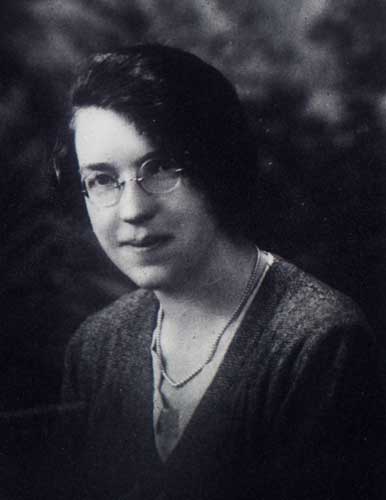Jane Haining, Scotland's Schindler
Campaigners urge recognition for the missionary who sacrificed her life in Auschwitz to stay with the Jewish children in her care. Jane Merrick reports

Your support helps us to tell the story
From reproductive rights to climate change to Big Tech, The Independent is on the ground when the story is developing. Whether it's investigating the financials of Elon Musk's pro-Trump PAC or producing our latest documentary, 'The A Word', which shines a light on the American women fighting for reproductive rights, we know how important it is to parse out the facts from the messaging.
At such a critical moment in US history, we need reporters on the ground. Your donation allows us to keep sending journalists to speak to both sides of the story.
The Independent is trusted by Americans across the entire political spectrum. And unlike many other quality news outlets, we choose not to lock Americans out of our reporting and analysis with paywalls. We believe quality journalism should be available to everyone, paid for by those who can afford it.
Your support makes all the difference.A British woman who sacrificed her life by refusing to leave Jewish orphans in her care is being hailed as one of the forgotten heroes of the Holocaust.
Jane Haining's story of personal sacrifice and bravery is emerging only now, nearly 65 years after her death. She is among a list of British people whose selfless heroism during the Second World War should be recognised posthumously in the honours list, campaigners say.
A Presbyterian missionary, Miss Haining is one of only 10 Scottish people believed to have been killed in a Nazi death camp. After the Nazis invaded Hungary in March 1944, she was ordered to leave the school in Budapest where she worked and return to Scotland.
But the 47-year-old refused, saying: "If these children need me in the days of sunshine, how much more do they need me in the days of darkness?"
Miss Haining was ordered to sew yellow Stars of David on the clothes of the orphan girls. A month later she was arrested for "offences" that included spying, working with Jews and listening to the BBC.
She admitted to all but political activity and was deported to Auschwitz, tattooed with the number 79467, along with some of her wards. She was gassed in August that year.
Gordon Brown has praised Haining's bravery in his latest book, Wartime Courage: Stories of Extraordinary Courage by Ordinary Men and Women in World War Two, and he spoke about her on his first trip to Israel as Prime Minister this summer.
A film of her life is in production, drawing comparisons to Oskar Schindler, the industrialist who saved more than 1,200 Jews and whose story was portrayed in the 1993 film Schindler's List. BBC Scotland will broadcast a programme about her on 29 December.
The personal acts of resistance of Miss Haining and others like her are also being remembered on Holocaust Memorial Day on 27 January, whose theme in 2009 is "Stand Up to Hatred". The Holocaust Educational Trust is campaigning for the Government to change the honours system to allow posthumous knighthoods and honours to be awarded to British rescuers such as Frank Foley, the MI6 spy who is known as the "Stourbridge Schindler" for saving thousands of Jews.
Miss Haining's name is inscribed near to Schindler's on the Holocaust memorial at Yad Vashem in Israel.
Karen Pollock, chief executive of the Holocaust Educational Trust, said: "Jane Haining was a remarkable woman who took a stand during the Holocaust by refusing to leave the Jewish orphans in her care in Budapest, defying calls for her to return to Scotland.
"Her form of resistance ultimately ended with the sacrifice of her own life and today stands as an example of how ordinary people can do extraordinary things that make such a difference to others' lives.
"At the Holocaust Educational Trust we believe that the time is right to raise awareness of British Holocaust heroes and heroines. Their brave acts have never been appropriately recognised in this country, so we are calling on the Government to review the statutes governing the honours system so these British heroes can receive a posthumous honour they truly deserve."
Miss Haining, from the village of Dunscore in Dumfries and Galloway, worked in Glasgow before volunteering to become a matron of a girls' home in Budapest at the age of 35.
She was on holiday in Cornwall when the Second World War broke out and immediately returned to Budapest.
According to her death certificate, she died in July 1944 at Auschwitz of "cachexia following intestinal catarrh", yet it is almost certain she was gassed with a group of Hungarian women on 16 August 1944.
One of Miss Haining's wards who survived the war said later: "I still feel the tears in my eyes and hear the siren of the Gestapo motor car.
"I see the smile on her face while she bade me farewell. I never saw Miss Haining again and when I went to the Scottish Mission to ask the minister about her I was told she had died. I did not want to believe it, but a long time later I realised that she had died for me, and for others."
The only memorials to Miss Haining in Britain are a stained glass window in Queen's Park church, Glasgow, where she once worshipped, and a tiny plaque in the Dunscore kirk.
The Church of Scotland said of her life: "Typical of all that is best in the Scottish tradition of missionary service, she gave the best years of her life to enhancing that tradition, and at the last gave life itself."
Join our commenting forum
Join thought-provoking conversations, follow other Independent readers and see their replies
Comments